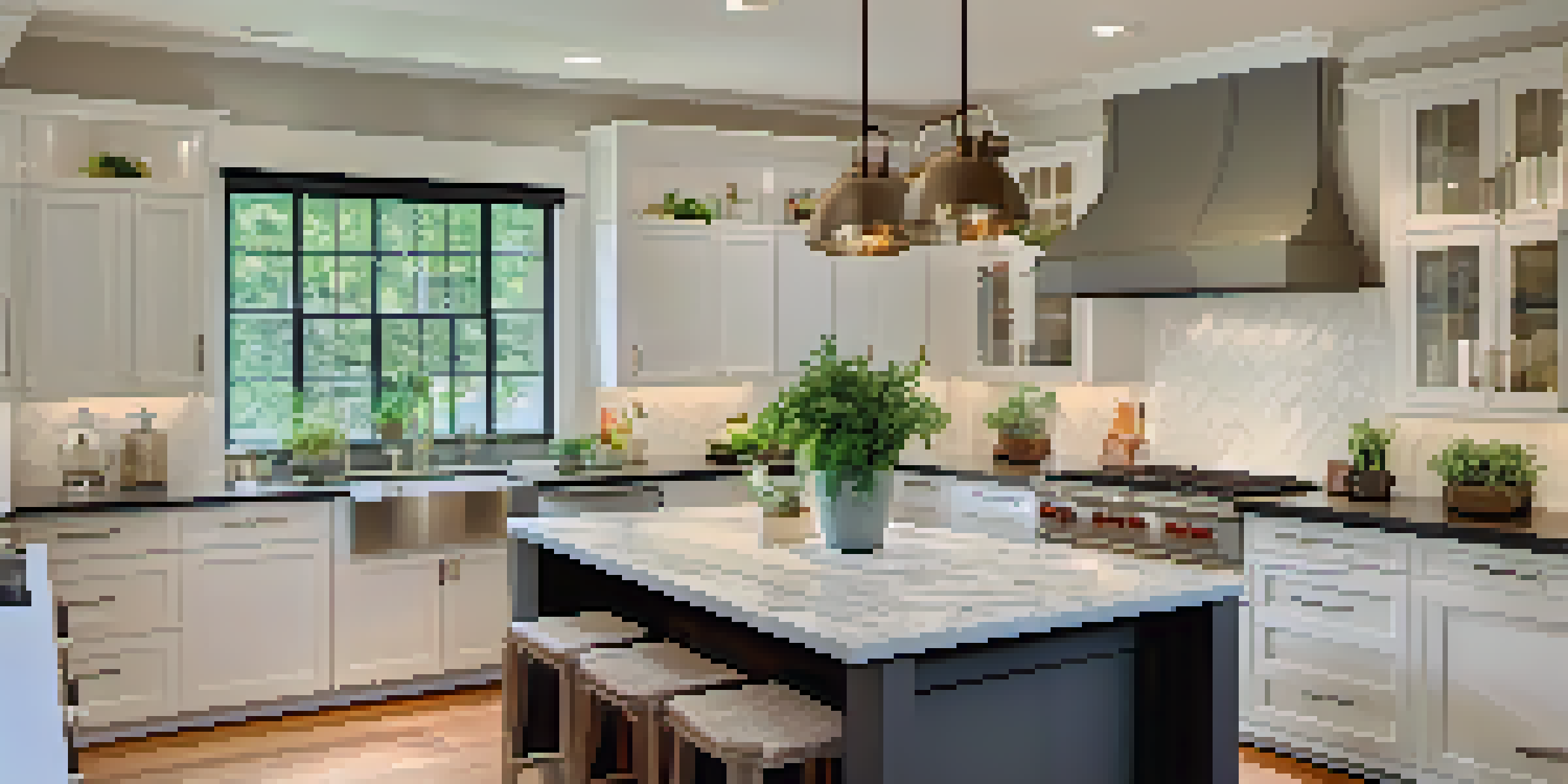Understanding the Cost of Home Renovations vs. ROI

The Basics of Home Renovation Costs
When considering home renovations, it's essential to understand the associated costs. These can include labor, materials, permits, and unexpected expenses. For instance, a simple kitchen update might start with a budget for cabinets and countertops but can quickly escalate with plumbing or electrical work. Knowing these basics can help homeowners prepare financially.
Home renovation is about transforming a house into a home, but it’s vital to be strategic about costs and value.
Expenses vary widely depending on the scope of the project. A full kitchen remodel could set you back tens of thousands, while a fresh coat of paint might cost only a few hundred. It’s crucial to prioritize your renovations based on your budget and desired outcomes. This way, you can avoid overspending and stay focused on what truly enhances your home.
Additionally, it's wise to account for the cost of living in your area. Renovation costs can differ significantly between urban and rural settings. By researching local rates, homeowners can better estimate their budgets and ensure they’re making informed decisions.
Understanding Return on Investment (ROI)
Return on Investment (ROI) is a metric that helps homeowners understand the financial return they can expect from a renovation. Essentially, it compares the cost of the renovation to the increase in home value it may bring. For example, if you spend $10,000 on a bathroom remodel and the home's value increases by $15,000, your ROI is 150%.

Calculating ROI can be tricky since it depends on various factors, including the local real estate market and the type of renovation. Some projects, like kitchen or bathroom remodels, typically yield higher ROIs than others, such as adding a swimming pool. Understanding these nuances helps homeowners prioritize projects that will provide the most value.
Understand Renovation Costs
Homeowners should account for labor, materials, and unexpected expenses when budgeting for renovations.
It's also important to remember that ROI isn't solely about monetary gain. A renovation can enhance your living experience, increase comfort, and improve functionality. These qualitative benefits can be just as important as financial returns, making your home more enjoyable.
Top Renovations with High ROI
Certain renovations are known for their high ROI, making them smart investments for homeowners. For instance, a minor kitchen remodel often ranks at the top of the list, with many homeowners seeing a significant return. Updating countertops, cabinets, and appliances can breathe new life into the space without breaking the bank.
Investing in your home is not just about aesthetics; it’s about enhancing your quality of life and increasing your property’s value.
Another renovation that tends to deliver great ROI is enhancing curb appeal. Simple projects like new siding, landscaping, or front door upgrades can significantly increase your home's value. First impressions matter, and an attractive exterior can draw in potential buyers, often leading to a quicker sale.
Lastly, adding more livable space, such as a finished basement or attic conversion, can yield impressive returns. Not only does this expand your home’s functionality, but it also provides extra square footage that can be appealing to future buyers.
Renovations That May Not Pay Off
While some renovations can significantly boost your home's value, others might not be worth the investment. For instance, luxurious upgrades like high-end appliances or elaborate landscaping may not always recoup their costs. Homebuyers often prioritize functionality over extravagance, making these projects less appealing.
Swimming pools are another example of renovations that may not offer a solid ROI. While they can enhance your enjoyment of the home, many buyers view them as a maintenance burden. In some markets, a pool might even deter potential buyers, leading to a decrease in offers.
Focus on High ROI Projects
Certain renovations, like kitchen updates and curb appeal enhancements, tend to provide a higher return on investment.
Understanding what renovations may not pay off can help homeowners make smarter choices. By focusing on projects that add genuine value and appeal, you can maximize both your enjoyment of the home and its marketability.
The Importance of Market Research
Before diving into renovations, conducting thorough market research is vital. Understanding local real estate trends can provide insights into what buyers are looking for in your area. For instance, if energy-efficient upgrades are becoming popular, investing in new windows or insulation might be a smart move.
Additionally, examining recent home sales in your neighborhood can help gauge potential ROI on specific renovations. If similar homes are selling for a premium due to updated features, that may signal a worthwhile investment. Conversely, if homes are languishing on the market, it might be a sign to rethink your renovation strategy.
Market research not only informs your renovation decisions but also helps you set realistic expectations. By aligning your projects with local demand, you can ensure that your investments will resonate with potential buyers down the line.
Budgeting for Home Renovations
Creating a realistic budget is crucial for any home renovation project. Start by determining how much you can comfortably spend without stretching your finances too thin. It's wise to include a contingency fund — typically around 10-20% of the total budget — to cover unexpected costs that may arise during the renovation.
Breaking down costs by category can also help you manage your budget effectively. Consider allocating funds for labor, materials, and any necessary permits or inspections. By understanding where your money will go, you can prioritize spending on the elements that truly enhance your home.
Conduct Market Research
Understanding local real estate trends helps homeowners make informed renovation choices that align with buyer preferences.
Finally, don't forget to consider financing options if needed. Whether through a home equity line of credit or a personal loan, understanding your financing can help you manage cash flow while completing the renovation. This way, you can focus on creating your dream space without financial stress.
Planning and Timing Your Renovation
Effective planning is essential for a successful home renovation. Start by creating a timeline that includes each phase of the project, from design to completion. This will help you stay organized and ensure that everything runs smoothly, minimizing disruptions to your daily life.
Timing is another critical factor to consider. Certain seasons may be more conducive to specific types of renovations. For example, outdoor projects are best suited for spring or summer, while interior work can often be done year-round. Choosing the right time can improve efficiency and lead to better results.

Lastly, be sure to communicate openly with contractors and suppliers. Keeping lines of communication clear can help address any potential issues before they escalate. With a solid plan in place, you’ll be well on your way to achieving your renovation goals.